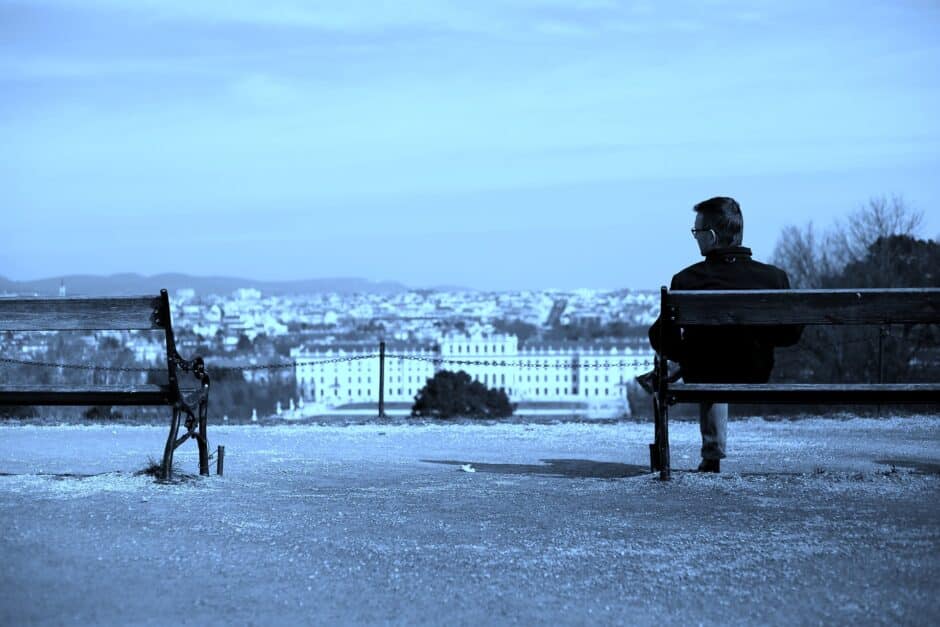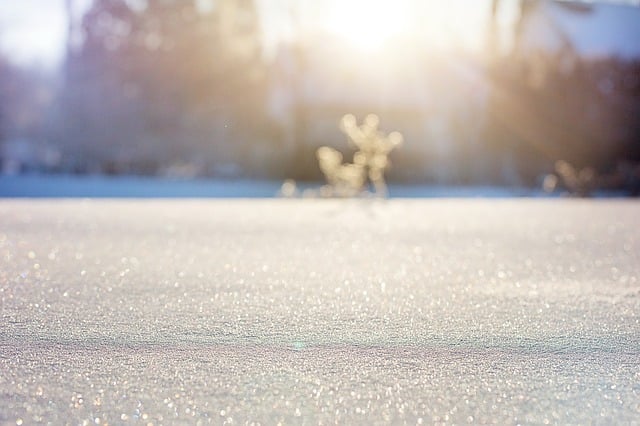by Alec O’Hanson
Winter comes after me like a starving dog. I can feel its breath against my heels when the leaves turn, hear the snap of its bitter teeth in the coldness of the wind. I know that by the time the leaves fall, I will have fallen with them. There is no running from something that lives inside of you like a dormant parasite.
By August, I can already tell this winter will be far too long. The sky itself is as hollow as the space in my chest. With each drop of the temperature, I can feel warmth draining from me; a steady trickle that’s just significant enough to know it’s happening, but also just faint enough that I can’t convince myself it’s really there.
It is hard not to feel helpless against the bitter cold when it creeps upon you and tangles itself into your skin so quietly. There is no warning or noticeable first frostbite. I wake up in the middle of the week and I realize it’s far too cold to go outside without a coat to protect me against the winds, and by the end of the next week I’ve decided it’s far too cold to go outside at all.
Before the tides of September hit, I find myself submerged in carpeted walls and the low, noise-cancelling hum of a false sense of security. My mother says it’s strength and willpower that puts me here, but when I tell the new therapist that I think winter is trying to kill me, I feel nothing but fragile and weak.
“The first step towards getting better,” she said, half-hidden by the frost-bitten car window, “is wanting to do so.”
It feels almost futile to attempt therapy only when I am finding myself so cold that I can’t feel my fingers, much less my own heart. I do not want to be in this room in the same way I don’t want to be anywhere else. It’s an hour of my day and a shred of my energy that every fiber of me wants to hold onto for tasks that used to take no time or effort at all. It’s almost as if I have put myself on emergency rations. I have developed a scarcity complex towards life itself — there is only so much of myself to give when I already feel so empty.
I tell this to my therapist, and she asks if I’m still on medication, which I am. But I’ve found that all they do is stabilize, and that holding still at a low is still nonetheless a flatlining low. But it’s a compromise, and I figure that being able to settle a score with myself with my bargaining chips in scarcity is the best I can ask for. It’s just difficult to explain this to somebody who only feels the cold on the surface of their skin instead of running deep beneath it like mine.
I have memorized the answers to the quiz my therapist gives me halfway into October. They aren’t lies, because if I’m going to put energy into it, I don’t want to waste it by sabotaging myself in such a pointless way. But I find myself tired of being tired, and I don’t have the energy to try and stay positive about what is still a consistent negative because I don’t have the energy to attempt any methods of improving the state of it.
That’s a mouthful if I’ve ever heard one, and a confusing one at that, so I stick to my compromises. More than anything, I want to be understood, so I speak in tongues that don’t fully translate to the same truth.
Do I struggle to fall or stay asleep? No, but I am sleeping more than usual. It’s another hour towards spring; another minute away from the cold. Do I feel down, depressed, or hopeless? They like when I joke about exam season, so I do, instinctively. It’s a half truth, which isn’t an entire lie. More often than not I feel nothing at all, as if the coldness of winter has sunken itself into my bones and made me numb to its bite. Have I lost interest in things that I typically enjoy? I don’t remember what it feels like to laugh, but somehow I’ve managed to waste all twenty-four hours of my day without realizing it, so I must not be that bored.
I make it to exactly five of these weekly appointments before the cold finally makes itself a home within my bones and I decide that I’m too tired to keep thawing it off only for it to freeze back in place. I also decide that medication is making me far too aware of what day of the week it is, which is easy — the pharmacy stops calling after the first time and I reckon in hindsight that the medication wasn’t really meant to warm me up in the first place. When there is very little to rely on, and when I am so opposed to unsteady footholds, I have to make these kinds of compromises. I am helpless, I tell myself, against the direction of the northern winds.
I spend the next two weeks scraping the bottom of an empty barrel, shaking and vomiting but most definitely feeling something for the first time since I bothered trying to medicate myself in the first place. Cold as I am, even the lick of flames against my frostbitten skin comes as a relief rather than the searing agony it ought to be.
Sometimes, it’s so easy to get caught up in everything and forget about what’s most important. When November strikes down, I have been so caught up wallowing in the throes of nothing that I have forgotten what important even is. I am getting colder again, and it is getting easier to tell people I’m sick and that I’m sorry but I can’t make it after all.
Actions have consequences, but if you bury your head far enough in the snow you can convince yourself they don’t. People stop calling and visiting because it’s impossible to reach out to somebody who has been swallowed up in the tundra so thoroughly. The peace and quiet is nice, even if the silence leaves way too much space for misery to fill. It’s still a choice that I made, amidst a suffocating helplessness, and I know what’s best for me in the coming months. I am terrified to spread the frostbite that clings to my skin and spreads into everything I touch.
There is a snowball at the top of the hill in the middle of a windstorm. It’s probably December, but I don’t fully realize this until it isn’t December anymore. Which is fine with me. I always found December to be somewhat of a drag, though I’m frequently told that I’m the one that’s a drag.
Perhaps there is a sliver of truth to that. A small, cold, and bitter part of me hates the lights and the family dinners and the presents and the holiday. I have a reputation for being a grinch, but at least that means nobody wants to bother me.
It is only with the reprieve of New Year’s Eve that, for a fleeting moment, I feel the ice melt away. There’s very little comfort that comes with the sting of thawing. It’s as if I’m standing in the center of a hurricane, surrounded by what I’ve missed and what is inevitable. There are so many days in a year. There are so many days of waking up and getting dressed and talking to people, and I am already wind-beaten and exhausted from the thousands of days behind me of this exhausting sameness.
I write a list of resolutions out of habit and desperation, and as always there are two of them that I find myself making every year. I want to get better, and, I want to make it out alive.
I can say, at least, that I have seen the last one through every year since I made it. I don’t write it because I feel particularly like there’s a chance I won’t do so, but rather because I can at least make sure I reach one of these resolutions by the end of the year. I like to think of it as a safety net, because when you are standing in the eye of a snowstorm and seeing three hundred and sixty five or so days of broken resolutions, it’s easy to forget which direction you were heading in the first place.
As for the first, it’s hard to tell if I ever meet it, but I think that might be the point of making the resolution. It’s impossible to define “better” when you struggle to define “worse” or really anything of significance at all. Measurement of successes is futile, which is something I learned from my therapist, but that means my acknowledging this must be indicative of an improvement somewhere. I’ll take what I can get in that aspect.
Sometimes I do feel like I have gotten better, but then the winter comes after me again and pulls me back down into it. It’s hard to tell how close you have flown towards the sun when you are already drowning twenty thousand leagues back beneath the freezing sea.
I make a promise to myself every year to get better not because I feel like it’s a point I can reach, but instead because I think the resolution itself is the foothold I have in doing so in the first place. The first step towards getting better is wanting to do so.
For a moment, as I watch another year bury itself in the snow that makes itself a graveyard around me, I want to do so. It’s a stab of desperation, and it’s molten.
I know that beneath the sheet of white is something warmer, something bigger. I have made it through plenty of starving winters before, and with each one I feel the sharpness of the cold grow softer against my weathered skin.
Humans and beasts and what lies between them have all adapted to circumstances to survive. Survival, if anything, seems to be the best way of defining “better.” What doesn’t kill you inevitably must make you stronger, so if facing a dozen winters hasn’t frozen me to death yet, then maybe there’s a possibility I’ve developed a resistance to the cold.
Winter comes after me like a starving dog, but at least I know when it comes. There are only so many times a dog can bite you before you learn how to grab it by the teeth, after all.
January arrives, and this time, I brace myself against the cold.
Alec O’Hanson is a (closeted) transgender man currently finishing his last semester at New River Community College, aiming to transfer to Radford University afterwards in pursuit of a bachelor’s degree in English. He has been writing in fervor for as long as he’s had access to words, and his goal is to make that everyone else’s problem, too.
~~~~~~~~~~~~~~~~~~~~~~~~~~~
Margaret Attwood swooned over The Child Finder and The Butterfly Girl, but Enchanted is the novel that we keep going back to. The world of Enchanted is magical, mysterious, and perilous. The place itself is an old stone prison and the story is raw and beautiful. We are big fans of Rene Denfeld. Her advocacy and her creativity are inspiring. Check out our Rene Denfeld Archive.
Order the book from Amazon or Bookshop.org
~~~~~~~~~~~~~~~~~~~~~~~~~~~
Anti-racist resources, because silence is not an option
~~~~~~~~~~~~~~~~~~~~~~~~~~~






